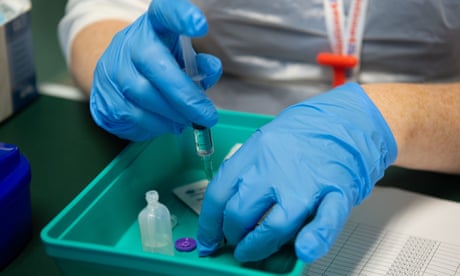Boosters increase the quantity and quality of antibodies significantly higher than those provided by the first two shots, which means that immunity is less likely to wane as quickly and that protection is greater over the same time. JL
Hannah Devlin reports in The Guardian:
Mutations in the virus mean its spike protein now looks different from the original Wuhan strain all current vaccines were designed to target. That means antibodies from previous infection and vaccination will be less efficient at intercepting Omicron. Because they stick to the virus less vigorously, a higher quantity of antibodies is required to compensate for them being less well matched. A booster dose increases the levels and quality of antibodies significantly above two doses, which means waning immunity will occur more slowly after a third dose.Covid-19, we should know by now, is a moving target. In autumn the rollout of boosters to older age groups was contentious. Now they’re the single biggest focus. So why do boosters help so significantly compared with first and second jabs, and are we on a conveyor belt towards needing an ever-increasing number of top-ups?
Even before Omicron, it was clear boosters would be required to maintain the levels of protection against infection, although protection against severe illness appeared to be holding up well.
Vaccines prompt the body to make neutralising antibodies that intercept Covid before the virus infects our cells, but circulating antibodies can wane over time. Data from Israel, one of the first countries to vaccinate its population, showed a drop-off in protection against infection after only three months. It revealed that were people about 15 times more likely to be infected six months after their second dose compared with a few weeks after it.
Even if most people remain protected against serious illness, this waning immunity presents a significant public health issue when a proportion of adults remain unvaccinated or have immune conditions that leave them vulnerable.
Omicron has made the need for boosters more urgent. Mutations in the virus mean its spike protein now looks quite different from that of the original Wuhan strain that all current vaccines were designed to target. That in turn means antibodies from previous infection and vaccination will be less efficient at intercepting Omicron. Because they stick to the virus less vigorously, a higher quantity of antibodies is also required to compensate for them being less well matched.
Studies show that a booster dose increases the levels of antibodies significantly above the level seen after two doses, which some hope means waning immunity will occur more slowly after a third dose, though insufficient time has passed to determine if this is the case.
Early studies also suggest that the quality of antibodies is higher following a booster. The immune system continues to refine exactly which antibodies are selected and amplified based on subsequent encounters with the virus or vaccine, and studies suggest there is a broader, more potent immune response following a third dose.
There is also reason for some optimism that vaccines may hold up better against severe disease than against infection. The immune system has a second line of defence in T cells, which attack cells already infected. These tend to stick around longer and they recognise parts of the virus that are more highly conserved, meaning Omicron’s mutations are less likely to throw them off the scent. So if antibodies are not good enough to stave off infection, T-cells can swoop in to bring the disease under control before it makes a person seriously unwell.
Laboratory data looks encouraging, but real-world outcomes are being followed closely in South Africa, the UK and elsewhere to answer this question, which remains one of the biggest uncertainties about how this wave will play out.
For now, vaccine makers are working on variant jabs that could be ready to deploy as soon as March, but tweaking current vaccines will leave the same vulnerabilities should Omicron in the future be overshadowed by another even more fast-spreading variant.
The next generation of vaccines, scientists hope, will not only be a good match to circulating strains but provide far broader immune protection so that they are effective against mutations. One possibility is a vaccine specifically designed to trigger a T-cell response to the viral replication machinery as opposed to the spike protein, which scientists have suggested could result in immunity lasting years rather than months.




















0 comments:
Post a Comment